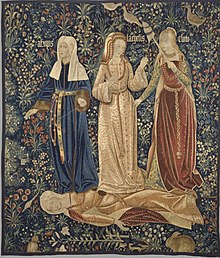
Back Klotho Breton Cloto Catalan Klóthó Czech Klotho (Mythologie) German Κλωθώ Greek Cloto Spanish Kloto Basque کلوتو Persian Clotho French קלותו HE
| Part of a series on |
| Ancient Greek religion |
|---|
 |



Clotho (/ˈkloʊθoʊ/; Greek: Κλωθώ) or Klotho, is a mythological figure. She is the youngest goddess of the Three Fates or Moirai. In ancient Greek mythology, she spins the thread of human life, her sisters draw out (Lachesis) and cut (Atropos) the thread. She also made major decisions, such as when a person was born, thus in effect controlling people's lives. This power enabled her not only to choose who was born, but also to decide when deities or mortals were to be saved or put to death. For example, Clotho resurrected Pelops when his father killed him. Her Roman equivalent is Nona.
As one of the three fates, her influence in Greek mythology was significant. Along with her sisters and Hermes, Clotho was given credit for creating the alphabet for their people. Even though Clotho and her sisters were worshiped as goddesses, their representation of fate is more central to their role in mythology. Thread represented human life and her decisions represented the fate of all people in society.